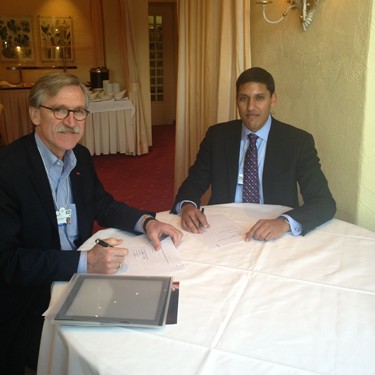
Efforts will include increasing access to technology, crop biofortification and capacity building
For Immediate Release
DAVOS — On the margins of the World Economic Forum at Davos, the U.S. Agency for International Development (USAID) and DuPont formally announced a joint agreement to deepen efforts to reduce global hunger and poverty by enabling smallholder farmers access to proven, safe, and transformative agricultural innovations. Signed by USAID Administrator Rajiv Shah and DuPont Executive Vice President James C. Borel at the World Economic Forum, the Memorandum of Understanding (MOU) delivers on commitments made through the New Alliance for Food Security and Nutrition and builds on a strong history of partnership between DuPont, USAID, university partners, the private sector, and NGOs.
“We know that by improving smallholder farmers’ access to key tools and technologies, we can help ensure they have the opportunities to participate in increasingly global markets,” said Dr. Shah. “Better productivity, easier market access, and higher incomes lead to less poverty and improved nutrition. This is the vision that drives USAID’s leadership of Feed the Future and our ongoing contributions to the New Alliance.”
The USAID and DuPont MOU builds upon a partnership where in places like Ethiopia and Ghana we are working together to improve the maize value chain to improve the productivity and income of at least 35,000 smallholder farmers in each country through the adoption of new technologies. Additionally, Asia and Latin America are also earmarked for initiatives. In the coming months, DuPont and USAID leadership teams will convene to discuss project planning. Under the new MOU, DuPont and USAID have outlined a number of efforts to help sustainably increase smallholder farmers’ yields and income potential while also improving nutrition outcomes over the next five years by:
- Strengthening access to proven and safe seed technologies, credit, markets, and better storage facilities to limit post-harvest loss;
- Supporting value chain development and formal linkages with commercial farms;
- Building capacity for more youth and women scientists in agriculture, including through engagement of the Young African Leaders Initiative;
- Improving nutrition through biofortification of orphan crops, particularly sorghum, and use of enzyme technology for milk shelf-life extension;
- Providing training and support for plant protection and soil testing for improved crop quality and yields;
- Advancing efforts to introduce climate-resilient crops and innovations like nitrogen-fixing trees to help smallholders sustainably address climate change;
- Enabling Southern Hemisphere country knowledge exchanges on agricultural development approaches.
This new collaboration with USAID marks a significant milestone in DuPont’s commitment to food security – which includes product innovation, engaging and educating youth, and improving livelihoods of farmers and their rural communities.
“For DuPont, this global MOU with USAID helps us to jointly capitalize on synergies between the DuPont science, technological and market capabilities with USAID’s development achievements, credibility and monitoring and evaluation expertise,” said Borel.
DuPont has been bringing world-class science and engineering to the global marketplace in the form of innovative products, materials, and services since 1802. The company believes that by collaborating with customers, governments, NGOs, and thought leaders we can help find solutions to such global challenges as providing enough healthy food for people everywhere, decreasing dependence on fossil fuels, and protecting life and the environment. For additional information about DuPont and its commitment to inclusive innovation, please visit http://www.dupont.com.
Announced by President Obama at the 2012 G-8 Summit, the New Alliance is a shared commitment between African governments, G-8 members and the private sector to work together to accelerate investments in agriculture to improve productivity, livelihoods and food security for smallholder farmers. Led by USAID, Feed the Future is the United States’ contribution to this global effort. Feed the Future supports countries in developing their own agriculture sectors to generate opportunities for economic growth and trade, particularly for smallholder farmers, many of whom are women.
To learn more about Feed the Future, visit www.feedthefuture.gov. For more on USAID: www.usaid.gov. Follow the latest @FeedtheFuture @USAID @rajshah #WEF14







Comment
Make a general inquiry or suggest an improvement.